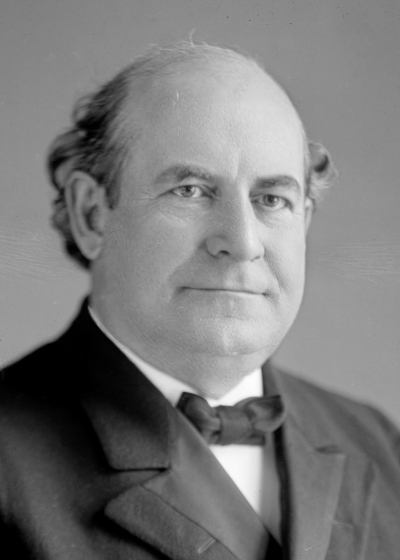The 1896 Democratic National Convention, held at the Chicago Coliseum from July 7 to July 11, was the scene of William Jennings Bryan's nomination as the Democratic presidential candidate for the 1896 U.S. presidential election.
At age 36, Bryan was the youngest presidential nominee in American history, only one year older than the constitutional minimum. Bryan's keynote "Cross of Gold" address, delivered prior to his nomination, lambasted Eastern monied classes for supporting the gold standard at the expense of the average worker. This was a repudiation of Cleveland administration's policy, but proved popular with the delegates to the convention.
Bryan secured the nomination on the fifth ballot over Richard P. Bland. Bryan declined to choose a Democratic vice presidential nominee, leaving the choice to his fellow delegates. Arthur Sewall of Maine was nominated on the fifth ballot. Bryan and Sewall ultimately lost to the Republican candidates, William McKinley and Garret Hobart.
William Jennings Bryan (March 19, 1860 – July 26, 1925) was an American orator and politician. Beginning in 1896, he emerged as a dominant force in the Democratic Party, running three times as the party's nominee for President of the United States in the 1896, 1900, and the 1908 elections. He served in the House of Representatives from 1891 to 1895 and as the Secretary of State under Woodrow Wilson. Because of his faith in the wisdom of the common people, he was often called "The Great Commoner".Born and raised in Illinois, Bryan moved to Nebraska in the 1880s. He won election to the House of Representatives in the 1890 elections, serving two terms before making an unsuccessful run for the Senate in 1894. At the 1896 Democratic National Convention, Bryan delivered his "Cross of Gold" speech which attacked the gold standard and the eastern moneyed interests and crusaded for inflationary policies built around the expanded coinage of silver coins. In a repudiation of incumbent President Grover Cleveland and his conservative Bourbon Democrats, the Democratic convention nominated Bryan for president, making Bryan the youngest major party presidential nominee in U.S. history. Subsequently, Bryan was also nominated for president by the left-wing Populist Party, and many Populists would eventually follow Bryan into the Democratic Party. In the intensely fought 1896 presidential election, Republican nominee William McKinley emerged triumphant. At age 36, Bryan remains the youngest person in United States history to receive an electoral vote. Bryan gained fame as an orator, as he invented the national stumping tour when he reached an audience of 5 million people in 27 states in 1896.
Bryan retained control of the Democratic Party and again won the presidential nomination in 1900. After the Spanish–American War, Bryan became a fierce opponent of American imperialism and much of his campaign centered on that issue. In the election, McKinley again defeated Bryan, winning several Western states that Bryan had won in 1896. Bryan's influence in the party weakened after the 1900 election and the Democrats nominated the conservative Alton B. Parker in the 1904 presidential election. Bryan regained his stature in the party after Parker's resounding defeat by Theodore Roosevelt and voters from both parties increasingly embraced some of the progressive reforms that had long been championed by Bryan. Bryan won his party's nomination in the 1908 presidential election, but he was defeated by Roosevelt's chosen successor, William Howard Taft. Along with Henry Clay, Bryan is one of the two individuals who never won a presidential election despite receiving electoral votes in three separate presidential elections held after the ratification of the Twelfth Amendment.
After the Democrats won the presidency in the 1912 election, Woodrow Wilson rewarded Bryan's support with the important cabinet position of Secretary of State. Bryan helped Wilson pass several progressive reforms through Congress, but he and Wilson clashed over U.S. neutrality in World War I. Bryan resigned from his post in 1915 after Wilson sent Germany a note of protest in response to the sinking of Lusitania by a German U-boat. After leaving office, Bryan retained some of his influence within the Democratic Party, but he increasingly devoted himself to religious matters and anti-evolution activism. He opposed Darwinism on religious and humanitarian grounds, most famously in the 1925 Scopes Trial. Since his death in 1925, Bryan has elicited mixed reactions from various commentators, but he is widely considered to have been one of the most influential figures of the Progressive Era.

1896Jul, 9
William Jennings Bryan delivers his Cross of Gold speech advocating bimetallism at the 1896 Democratic National Convention in Chicago.
Choose Another Date
Events on 1896
- 28Jan
Speed limit
Walter Arnold of East Peckham, Kent, becomes the first person to be convicted of speeding. He was fined one shilling, plus costs, for speeding at 8 mph (13 km/h), thereby exceeding the contemporary speed limit of 2 mph (3.2 km/h). - 26May
Dow Jones Industrial Average
Charles Dow publishes the first edition of the Dow Jones Industrial Average. - 16Aug
Klondike Gold Rush
Skookum Jim Mason, George Carmack and Dawson Charlie discover gold in a tributary of the Klondike River in Canada, setting off the Klondike Gold Rush. - 21Sep
Horatio Kitchener, 1st Earl Kitchener
Mahdist War: British forces under the command of Horatio Kitchener takes Dongola in the Sudan. - 22Sep
George III of the United Kingdom
Queen Victoria surpasses her grandfather King George III as the longest reigning monarch in British history.

 English
English  español
español  français
français  português
português  русский
русский  العربية
العربية  简体中文
简体中文 